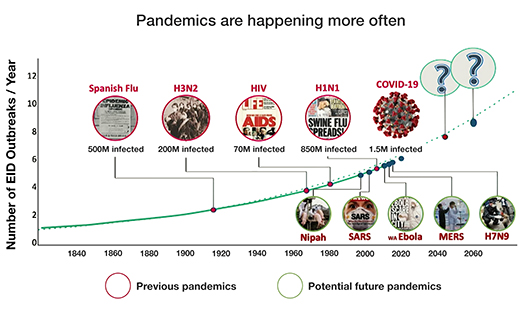
An ancient threat that’s getting worse
For centuries mankind has been plagued by zoonoses - diseases transmitted to us from animals. To name but a few: the infamous 1918 influenza pandemic that killed about 50 million people; HIV; Ebola; Malaria and of course Covid-19. What’s changed is that in recent years the frequency of outbreaks has increased.
Several new zoonotic diseases have emerged, and several known zoonoses, thought absent for decades, have come back to life.
“Exponential," is how Dr Peter Daszak of the EcoHealth Alliance describes the rise in global pandemics. “It follows closely the rise in population density around the world, our increasing dependence on the globalised trade and travel network for economic growth, and our increasing exploitation of nature,” says Dr Daszak.
“Unsustainable growth and expansion into wildlife habitats and especially things that bring us very close to wildlife, like the wildlife trade, are driving this emergence.” - Dr Peter Daszak
William Hague, Chair of the UfW Taskforces, reiterates the link between the Illegal Wildlife Trade (IWT) and zoonotic diseases and says that, “The trade in wild animals and the consumption of their parts are now widely believed to be at the root of the Covid-19 pandemic and can easily be repeated in the future.”
HRH The Duke of Cambridge calls for the eradication of Illegal Wildlife Trade
His Royal Highness, Prince William spearheads The Royal Foundation that, through two taskforces: The Transport Taskforce and the Financial Taskforce, bring governments, businesses and NGOs together to eradicate, or at the very least, get control of IWT.

Click here to find out more about the Royal FoundationThere is a real chance to ensure that the urgent steps that the world must take to prevent future zoonotic disease pandemics are designed in a way that also helps to eradicate the illegal wildlife trade.
The Covid-19 wake-up call
HRH The Duke of Cambridge believes Covid-19 provides a notable opportunity for us to finally eradicate IWT, an enterprise worth an estimated 20 billion dollars a year.
“Never before have the public health risks of the wildlife trade come into such sharp focus. Right now, there is a real chance to ensure that the urgent steps that the world must take to prevent future zoonotic disease pandemics are designed in a way that also helps to eradicate the illegal wildlife trade. This will require concerted effort and teamwork from international organisations governments, law enforcement, the NGO community, and the private sector,” he said.
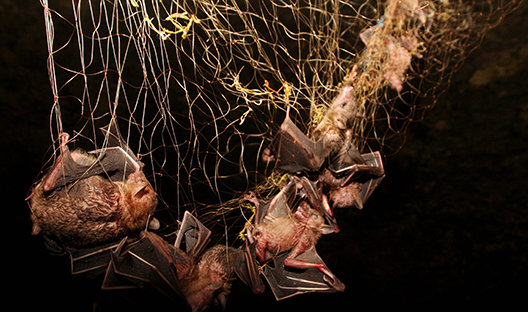
Bats, pangolins and cave hunting
Daszak says coronaviruses come from bats, living in caves across South-East Asia, and that new viruses are being discovered at an alarming rate. “Working with our Chinese colleagues, we found over 780 new bat coronaviruses in China over the last 15 years. There’s a huge diversity! We don't know how many of these could become a pandemic, but we know that SARS is in there, we know that SARS-2 is in there, and there are many more to come if we don't do something about this,” says Daszak.
He continues: “People believe eating bats and pangolins gives you health and longevity, but in fact they make you ill and cause pandemics. It's a long-held belief that’s very tough to break.” But break it we must, and the health and economic crises of Covid-19 are starting to do just that.
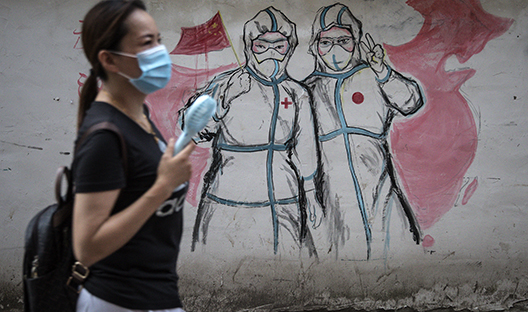
Chinese tide turns against IWT
Governments, particularly China, acted swiftly to change IWT policy and enforcement in the wake of Covid-19. Dr Lu Zhi, a Professor of Conservation Biology at Peking University, says she was surprised and encouraged at the groundswell support for China’s February ban on all wildlife food consumption.
An online survey of 100,000 people, from February to March 2020, showed 90% were in support of the ban.
Dr Lu recognises that this overwhelming support will likely decline as the pandemic lessens its global grip, but she hopes the scale of Covid-19 leaves a lasting impression. “I think the scale and the intensity of this threat to human health is much bigger than SARS was. So, I think there might be a slight sliding after the pandemic finishes, but with repeated messaging and repeated education to younger generations, I think this willingness of reducing wildlife consumption will stand.”
China conducted an online survey of 100,000 people, from February to March, and 90% were in support of the ban on wild meat for eating.
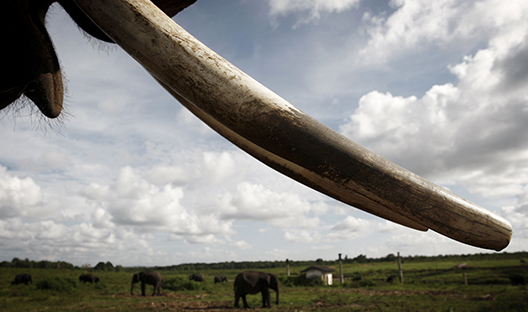
Financial flows from IWT finally getting notable attention
Financial Action Task Force (FATF) is an intergovernmental body within the Organisation for Economic Cooperation and Development (OECD) and is the global standard-setter for anti-money laundering and terrorist financing. Recently FATF decided to study the financial flows into the illegal wildlife trade and last month it published their first-ever global report on the trade.
David Fein, UfW’s Financial Taskforce Vice-Chair, drew attention to a specific area of the report which states that despite billions of dollars generated from IWT most efforts taken by countries today have rarely focused on the financial aspect of the crime. “We know that must change and I believe it will change especially with the FATF's recognition of IWT as a significant but overlooked financial crime.”
Fein went on to reiterate that the illegal wildlife trade is a major transnational organised crime that fuels corruption, threatens biodiversity, and can have significant public health impacts.
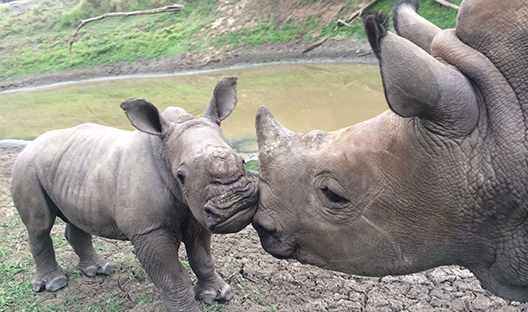
In Africa more elephants are now being poached than born each year, the numbers for rhinos, pangolins, lions, tigers and other endangered species are equally dire.
“Our mission is urgent- tens of thousands of elephants are killed each year with such tragic efficiency that in Asia elephants are gone from 85% of their historic range."
Fein added, "Conservationists have worked for years to provide the first line of defense against poachers, but the survival of the elephants and other endangered species shouldn't be left solely to conservationists in the field because they are up against a highly organised well-financed and transnational adversary.”
174 companies have joined United for Wildlife on its mission to eradicate IWT
174 companies have joined United for Wildlife on its mission to eradicate IWT
Financial institutions roll up their sleeves
Banks and other financial institutions are starting to appreciate the threat and sizable amount of cash flows from IWT and are rallying to do something about it. Earlier this year, in a first of-its-kind-meeting in South Africa hosted by United for Wildlife and Investec, the financial sector, government and law enforcement met to discuss ways to combat the theft.
The hope is that with the cooperation of banks, South African Money Laundering Integrated Taskforce (SAMLIT), the Financial Intelligence Centre (FIC) and law enforcement - the kingpins of this organised crime will be brought down, with no avenues to launder their “dirty cash.”
Organisations now understand that being associated with these syndicates carry significant risk for their brand. Gerald Byleveld, Group Money Laundering Reporting Officer at Investec and his team phrase this phenomenon as "Dirty money stains a good reputation".
Working towards harsher sentences for poachers
Byleveld and the FIC are leading the SAMLIT search into the financial flows from IWT to better understand how the money is laundered through the SA system.
“Often prosecutions are only for wildlife crimes, not financial because the case for financial crime is not significantly investigated to allow prosecutors to convict the poacher for both. Yet we know a financial crime was committed. If criminals are prosecuted for both, the sentences will be much harsher,” says Byleveld.
Wiping out the grey area between illegal and legal trade
In terms of legislation, Peter Knights, founder and CEO of WildAid, argues that enforcement falls short because each country has differing animals appearing on their banned list. “No nation on earth that has a blanket ban on wild meat. A more pragmatic approach is for each country to have a very short allowed list of species that will be permitted,” said Knights.
China is currently in the process of reviewing their ‘banned list’. Knights says it has reduced from 54 species to just 12, all of which are all commonly known and easily identifiable, making law enforcement far simpler.
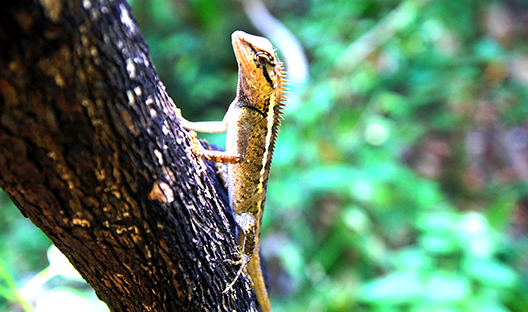
Biodiversity- The foundation of human health
Elizabeth Maruma Mrema, Executive Secretary of the United Nations Convention on Biological Diversity, reiterates that biological diversity is much more valuable than ticking off one’s animal count on a game drive.
“The present Covid-19 pandemic has served as a wake-up call and a reminder of the importance of biodiversity for our health and well-being."
Maruma Mrema says biodiversity loss narrows genetic and species diversity. "This leads to less resilience to disease of any kind thereby presenting a fundamental risk to the health and stable ecosystems that sustain all aspects of our societies. Illegal wildlife trade helps contribute to the loss of resilience.”
Browse further in




